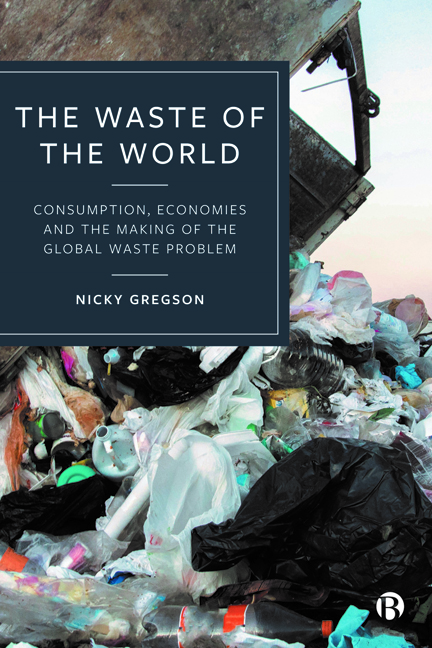Book contents
- Frontmatter
- Contents
- Acknowledgements
- Preface
- 1 The Global Waste Problem and How to Think about It: Or, how to understand the ‘too much waste’ problem
- 2 Discard, Social Order and Social Life: Or, discard is foundational to understanding waste
- 3 Consumption, Consumer Practices and Consumer Discard: Or, how consumer discard relates to economies
- 4 Conduits, Value Regimes and Valuation: Or, following consumers’ discarded things
- 5 Recommodifying Discard: Or, the challenges of turning discard into an economic good
- 6 Waste, Money and Finance: Or, how turning discard into waste turns waste into an energy resource and an asset
- 7 Future Directions: Or, rewiring waste through the three Ds (decarbonization, digital and discard)
- Notes
- References
- Index
4 - Conduits, Value Regimes and Valuation: Or, following consumers’ discarded things
Published online by Cambridge University Press: 18 January 2024
- Frontmatter
- Contents
- Acknowledgements
- Preface
- 1 The Global Waste Problem and How to Think about It: Or, how to understand the ‘too much waste’ problem
- 2 Discard, Social Order and Social Life: Or, discard is foundational to understanding waste
- 3 Consumption, Consumer Practices and Consumer Discard: Or, how consumer discard relates to economies
- 4 Conduits, Value Regimes and Valuation: Or, following consumers’ discarded things
- 5 Recommodifying Discard: Or, the challenges of turning discard into an economic good
- 6 Waste, Money and Finance: Or, how turning discard into waste turns waste into an energy resource and an asset
- 7 Future Directions: Or, rewiring waste through the three Ds (decarbonization, digital and discard)
- Notes
- References
- Index
Summary
Chapters 2 and 3 have shown that discarding and consumer discard are inevitable facets of social life and the organization of contemporary capitalist economies. They have also established the insights that come from thinking about consumption not simply as the stuff that we buy, or even dispose of, but as stuff we do things with, for it is this that connects acquisition with divestment. One of the many advantages of this perspective is that it emphasizes that consumption – as this is lived by people in an everyday sense – involves multiple, synchronous but, for individuals, mostly sequential practices. If I am cooking the dinner, for example, I’m in the kitchen, working with organic stuff, turning food into a meal. Doing that also involves pots and pans, cooking implements, a hob and/or oven, maybe a recipe. I may also be listening to the radio or to a podcast, but while I’m doing this I most certainly am not driving the car, reading a book, playing my fiddle or out on my bike. The things that I need to do those practices, then, lie idle while I’m doing the cooking – and for much of the time, what we can think of as the social lives of things are like this. We actually use our possessions for quite limited amounts of time. The idleness of many consumer things has been one of the primary motivations behind efforts to grow what is termed the ‘sharing economy’, grounded in access to goods, through renting and leasing. The way I prefer to think about idleness, however, starts from the reality that consumption for the majority of people is mostly still grounded in the ownership of many things. This means that our things continually move in and out of the category that is the surplus.
The surplus as this relates to consumer goods works on a spectrum of intermittency, with different things spending more or less time in this category. At one end lie the things that we utilize on a daily basis, or multiple times a day – clothes (but not all clothes), personal hygiene products like toothbrushes and razors, food stocks, cutlery, plates and bowls, mugs, cooking implements, mobile phones and computers, often cars.
- Type
- Chapter
- Information
- The Waste of the WorldConsumption, Economies and the Making of the Global Waste Problem, pp. 76 - 103Publisher: Bristol University PressPrint publication year: 2023



